 Tìm kiếm
Tìm kiếm
Chương VII Luật giáo dục 2019: Đầu tư và tài chính trong giáo dục
| Số hiệu: | 43/2019/QH14 | Loại văn bản: | Luật |
| Nơi ban hành: | Quốc hội | Người ký: | Nguyễn Thị Kim Ngân |
| Ngày ban hành: | 14/06/2019 | Ngày hiệu lực: | 01/07/2020 |
| Ngày công báo: | 20/07/2019 | Số công báo: | Từ số 569 đến số 570 |
| Lĩnh vực: | Giáo dục | Tình trạng: | Còn hiệu lực |
TÓM TẮT VĂN BẢN
Văn bản tiếng việt
Văn bản tiếng anh
Nguồn tài chính đầu tư cho giáo dục bao gồm:
1. Ngân sách nhà nước;
2. Nguồn vốn đầu tư hợp pháp của tổ chức, cá nhân trong nước và nước ngoài;
3. Nguồn thu từ dịch vụ giáo dục, đào tạo, khoa học và công nghệ; dịch vụ phục vụ, hỗ trợ hoạt động giáo dục của cơ sở giáo dục; nguồn thu từ hoạt động sản xuất, kinh doanh; lãi tiền gửi ngân hàng và nguồn thu hợp pháp khác theo quy định của pháp luật;
4. Kinh phí đặt hàng, giao nhiệm vụ của Nhà nước;
5. Nguồn vốn vay;
6. Nguồn tài trợ, viện trợ, tặng cho của các tổ chức, cá nhân trong nước và nước ngoài.
1. Nhà nước ưu tiên hàng đầu cho việc bố trí ngân sách giáo dục, bảo đảm ngân sách nhà nước chi cho giáo dục, đào tạo tối thiểu là 20% tổng chi ngân sách nhà nước.
2. Ngân sách nhà nước chi cho giáo dục được phân bổ theo nguyên tắc công khai, dân chủ; căn cứ vào quy mô giáo dục, điều kiện phát triển kinh tế - xã hội của từng vùng; bảo đảm ngân sách để thực hiện phổ cập giáo dục, phát triển giáo dục ở vùng dân tộc thiểu số và vùng có điều kiện kinh tế - xã hội đặc biệt khó khăn.
Nhà nước có trách nhiệm bố trí kinh phí đầy đủ, kịp thời để thực hiện phổ cập giáo dục và phù hợp với tiến độ của năm học.
3. Cơ quan quản lý giáo dục, cơ sở giáo dục có trách nhiệm quản lý, sử dụng có hiệu quả phần ngân sách giáo dục được giao và nguồn thu khác theo quy định của pháp luật.
Bộ, cơ quan ngang Bộ, Hội đồng nhân dân và Ủy ban nhân dân các cấp có trách nhiệm đưa việc xây dựng trường học, công trình thể dục, thể thao, văn hóa, nghệ thuật phục vụ giáo dục vào quy hoạch, kế hoạch phát triển kinh tế - xã hội của ngành và địa phương; ưu tiên đầu tư tài chính và đất đai cho việc xây dựng trường học và ký túc xá cho học sinh, sinh viên trong kế hoạch phát triển kinh tế - xã hội.
1. Nhà nước khuyến khích, tạo điều kiện cho tổ chức, cá nhân đầu tư, đóng góp trí tuệ, công sức, tài sản cho giáo dục.
2. Các khoản đóng góp, tài trợ cho giáo dục của tổ chức, cá nhân được trừ khi xác định thu nhập chịu thuế theo quy định của pháp luật về thuế.
3. Tổ chức, cá nhân đầu tư xây dựng công trình phục vụ cho giáo dục; đóng góp, tài trợ, ủng hộ tiền hoặc hiện vật để phát triển sự nghiệp giáo dục được xem xét để ghi nhận bằng hình thức thích hợp.
1. Học phí là khoản tiền người học phải nộp để chi trả một phần hoặc toàn bộ chi phí của dịch vụ giáo dục, đào tạo. Mức học phí được xác định theo lộ trình bảo đảm chi phí dịch vụ giáo dục, đào tạo do Chính phủ quy định; đối với cơ sở giáo dục nghề nghiệp, cơ sở giáo dục đại học thực hiện theo quy định của Luật Giáo dục nghề nghiệp và Luật Giáo dục đại học.
2. Chi phí của dịch vụ giáo dục, đào tạo gồm toàn bộ chi phí tiền lương, chi phí trực tiếp, chi phí quản lý, chi phí khấu hao tài sản cố định phục vụ trực tiếp và gián tiếp hoạt động giáo dục theo chương trình giáo dục.
Mức thu dịch vụ tuyển sinh mà người dự tuyển phải nộp khi tham gia xét tuyển, thi tuyển được xác định theo lộ trình tính đúng, tính đủ.
3. Học sinh tiểu học trong cơ sở giáo dục công lập không phải đóng học phí; ở địa bàn không đủ trường công lập, học sinh tiểu học trong cơ sở giáo dục tư thục được Nhà nước hỗ trợ tiền đóng học phí, mức hỗ trợ do Hội đồng nhân dân cấp tỉnh quyết định.
4. Trẻ em mầm non 05 tuổi ở thôn, xã đặc biệt khó khăn, vùng đồng bào dân tộc thiểu số, vùng sâu, vùng xa, vùng bãi ngang ven biển, hải đảo được miễn học phí.
5. Trẻ em mầm non 05 tuổi không thuộc đối tượng quy định tại khoản 4 Điều này và học sinh trung học cơ sở được miễn học phí theo lộ trình do Chính phủ quy định.
6. Cơ chế thu và quản lý học phí, các khoản thu dịch vụ trong hoạt động giáo dục được quy định như sau:
a) Chính phủ quy định cơ chế thu và quản lý học phí đối với các cơ sở giáo dục mầm non, cơ sở giáo dục phổ thông, cơ sở giáo dục nghề nghiệp, cơ sở giáo dục đại học công lập;
b) Hội đồng nhân dân cấp tỉnh quyết định khung học phí hoặc mức học phí cụ thể, các khoản thu dịch vụ phục vụ, hỗ trợ hoạt động giáo dục của nhà trường đối với cơ sở giáo dục công lập theo thẩm quyền quản lý nhà nước về giáo dục trên cơ sở đề nghị của Ủy ban nhân dân cấp tỉnh;
c) Ủy ban nhân dân cấp tỉnh quy định cơ chế thu và sử dụng mức thu dịch vụ tuyển sinh các cấp học do địa phương quản lý sau khi được Hội đồng nhân dân cấp tỉnh thông qua;
d) Cơ sở giáo dục dân lập, cơ sở giáo dục tư thục được quyền chủ động xây dựng mức thu học phí và các dịch vụ khác bảo đảm bù đắp chi phí và có tích lũy hợp lý. Thực hiện công khai chi phí của dịch vụ giáo dục, đào tạo và mức thu theo cam kết trong đề án thành lập trường, công khai cho từng khóa học, cấp học, năm học theo quy định của pháp luật.
Việc xuất bản sách giáo khoa, giáo trình, tài liệu dạy học; sản xuất và cung ứng thiết bị dạy học, đồ chơi cho trẻ em trong cơ sở giáo dục mầm non; nhập khẩu sách, báo, tài liệu giảng dạy, học tập, thiết bị dạy học, thiết bị nghiên cứu dùng trong cơ sở giáo dục được Nhà nước ưu đãi về thuế theo quy định của pháp luật về thuế.
1. Cơ sở giáo dục công lập thực hiện quản lý các khoản thu, chi tài chính, quản lý sử dụng tài sản theo quy định của Luật Ngân sách nhà nước, Luật Quản lý sử dụng tài sản công và quy định khác của pháp luật có liên quan; thực hiện chế độ kế toán, kiểm toán, thuế và công khai tài chính theo quy định của pháp luật.
2. Cơ sở giáo dục dân lập, cơ sở giáo dục tư thục hoạt động theo nguyên tắc tự chủ về tài chính, thực hiện chế độ kế toán, kiểm toán, thuế, định giá tài sản và công khai tài chính theo quy định của pháp luật. Khoản thu của cơ sở giáo dục dân lập, cơ sở giáo dục tư thục được dùng để chi cho các hoạt động của cơ sở giáo dục, thực hiện nghĩa vụ đối với ngân sách nhà nước, thiết lập quỹ đầu tư phát triển và các quỹ khác của cơ sở giáo dục, phần còn lại được phân chia cho nhà đầu tư theo tỷ lệ vốn góp, trừ cơ sở giáo dục hoạt động không vì lợi nhuận.
3. Cơ sở giáo dục phải công bố công khai chi phí của dịch vụ giáo dục, đào tạo và mức thu phí cho từng năm học đối với giáo dục mầm non, giáo dục phổ thông; cho từng năm học và dự kiến cho cả khóa học đối với giáo dục nghề nghiệp, giáo dục đại học.
1. Tài sản của trường dân lập thuộc sở hữu của pháp nhân nhà trường. Tài sản của trường dân lập được Nhà nước bảo hộ theo quy định của pháp luật.
2. Tài sản của trường tư thục thuộc sở hữu của nhà đầu tư, hình thành từ vốn góp của nhà đầu tư, được xác định bằng biên bản góp vốn của nhà đầu tư. Việc chuyển phần tài sản góp vốn cho trường thực hiện theo quy định của pháp luật.
3. Việc chuyển nhượng vốn đối với trường dân lập, trường tư thục phải bảo đảm sự ổn định và phát triển của trường, được thực hiện theo quy định của Chính phủ.
1. Trường dân lập, trường tư thục được Nhà nước giao hoặc cho thuê đất, giao hoặc cho thuê cơ sở vật chất, hỗ trợ ngân sách khi thực hiện nhiệm vụ do Nhà nước đặt hàng, được hưởng các chính sách ưu đãi về thuế và tín dụng; được Nhà nước bảo đảm kinh phí để thực hiện chính sách đối với người học quy định tại Điều 85 của Luật này.
2. Chính phủ quy định chi tiết Điều này.
INVESTMENT AND FINANCE IN EDUCATION
Article 95. Financial sources of educational investment
Financial sources of investment in education comprise:
1. State budget;
2. Legal investment capitals of domestic and foreign organisations and individuals;
3. Incomes from educational, training, scientific and technological services; service and assistance to educational operation of educational institutions; incomes from business operation; interest from deposits in banks and other legal incomes as regulated by law;
4. Funding for fulfilment of the State’s requests;
5. Loans;
6. Sponsorship, aid, grants of domestic and international organisations and individuals.
Article 96. State budget for investment in education
1. The State shall give first priority to the allocation of state budget for education, ensuring that educational and training expenditures take up at least 20% of the State budget.
2. The State budget for education must be allocated on the principles of transparency and democracy, based on the educational scale, socio-economic development conditions of each region; securing budget for universalized education, educational development in ethnic minority areas and areas with exceptional socio-economic difficulties.
The State shall be responsible for the full and timely allocation of budget so as to facilitate the universalization of education and to meet the progress of the school year.
3. Education authorities and educational institutions shall be responsible for effective management and use of the allocated budget for education and other incomes as prescribed by law.
Article 97. Priority in finance and land allocation for building schools
Ministries, ministerial-level agencies, People's Councils and People's Committees at all levels shall be responsible for incorporating the construction of schools, sporting, athletic, cultural, artistic facilities in service of education into the planning and socio-economic development plan of their sectors and localities; and shall give priority in finance and land allocation for the construction of schools and dormitories for students and students in their socio-economic development plans.
Article 98. Encouragement to invest in education
1. The State shall encourage and enable organisations and individuals to invest and contribute their intellects, labour and financial resources to education.
2. Contributions and grants made by organisations and individuals to education shall be removed when determining taxable income in accordance with regulations on taxation.
3. Organisations and individuals investing in the construction of infrastructure catering to education; contributing, sponsoring and funding in cash or in kind for educational development shall be recognised appropriately.
Article 99. Tuition and expenses of educational and training services
1. Tuition is a contribution made by learners to partially or fully cover expenses of educational and training services. Tuition rate is determined based on road maps for assurance of expenses for educational and training services prescribed by the Government. For institutions of vocational education and higher education, this rate is calculated based on the Law on Vocational education and Law on Higher education.
2. Expenses of educational and training services include the total amount of salary, direct costs, management costs and depreciation of fixed assets in direct or indirect service of educational operation in accordance with educational programmes.
Admission fees contributed by candidates when submitting an application or taking an entrance examination shall be determined based on road maps of accuracy and adequacy.
3. Students at primary education level in public educational institutions are not required to pay tuition; in areas lacking public schools, primary school students in private educational institutions shall receive subsidies on tuition from the State, with the support rate specified by provincial People’s Councils.
4. Pre-school children at 05 years of age in villages and communes with exceptional difficulties, ethnic minority areas, remote and isolated areas, coastal areas and islands shall be exempted from tuition.
5. Pre-school children at 05 years of age beside those regulated in clause 4 of this Article and students at lower secondary education level shall be exempted from tuition based on road maps specified by the Government.
6. Mechanisms for collecting and managing tuition and service fees of educational operation are prescribed as follows:
a) The Government shall set tuition collecting and managing mechanisms for public institutions of preschool education, general education, vocational education and higher education;
b) Provincial People's Councils shall set the tuition framework and detailed tuition rate and fees of services and assistance for educational operation in public educational institutions as authorised and at the proposal of provincial People's Committees;
c) Provincial People's Committees shall set collecting and using mechanisms for admission fees of each educational level under provincial management after receiving the approval from provincial People's Councils;
d) People-founded and private educational institutions are entitled to set the rate of their tuition and other service fees, ensuring expense recoupment and reasonable accumulation. Publicly announce expenses of educational and training services and fee rate as guaranteed in school’s establishment proposal; and on the basis of each educational course/level/year as prescribed by law.
Article 100. Tax incentives for textbooks, teaching materials and equipment
The State shall provide tax incentives for the publication of textbooks, syllabi and teaching materials; for the production and supply of teaching equipment and children toys in institutions of preschool education; for the import of books, periodicals, teaching and learning materials, teaching equipment and research equipment used in educational institutions in accordance with tax laws.
Article 101. Financial regulations for educational institutions
1. Public educational institutions shall manage financial incomes and expenditures, manage property use as regulated by the Law on State budget, Law on Management and use of public properties and other relevant regulations; implement regulations on accounting, auditing, taxation and financial transparency in compliance with the law.
2. People-founded and private institutions shall operate on the principle of financial autonomy, implement regulations on accounting, auditing, taxation, property valuation and financial transparency as prescribed by law. Incomes of people-founded and private institutions shall be used for expenditures of the institutions’ necessary operations, fulfilment of duties to the State budget, establishment of investment development funds and other funds of the institutions. The remaining incomes shall be distributed to investors according to their contributions of capital, except for not-for-profit educational institutions.
3. Educational institutions shall publish expenses of educational and training services and fee rate for each school year of preschool education and general education; for each school year and provisionally for each course of vocational education and higher education.
Article 102. Rights on ownership of properties and transfer of capital for people-founded schools and private schools
1. Properties of people-founded schools fall under the ownership of the school as a juridical person and under the protection of the State as prescribed by law.
2. Properties of private schools fall under the ownership of investors, are formed from capital contributions of investors and determined by contract of capital contribution of investors. Transfer of contributed capital shall take place as prescribed by law.
3. Capital transfer of people-founded schools, private schools shall ensure the stability and development of the school and take place as prescribed by the Government.
Article 103. Preferential policies for people-founded schools and private schools
1. People-founded and private schools shall receive land allocation or rental, infrastructure allocation or rental by the State, receive budget support when implementing duties requested by the State, and benefit from preferential policies on taxes and credits; shall receive financial assurance from the State in order to implement policies for learners as stipulated in Article 85 of this Law.
2. The Government shall provide for this Article.
Cập nhật
Bài viết liên quan
Mẫu đơn xin nhập học Đại học mới nhất 2025
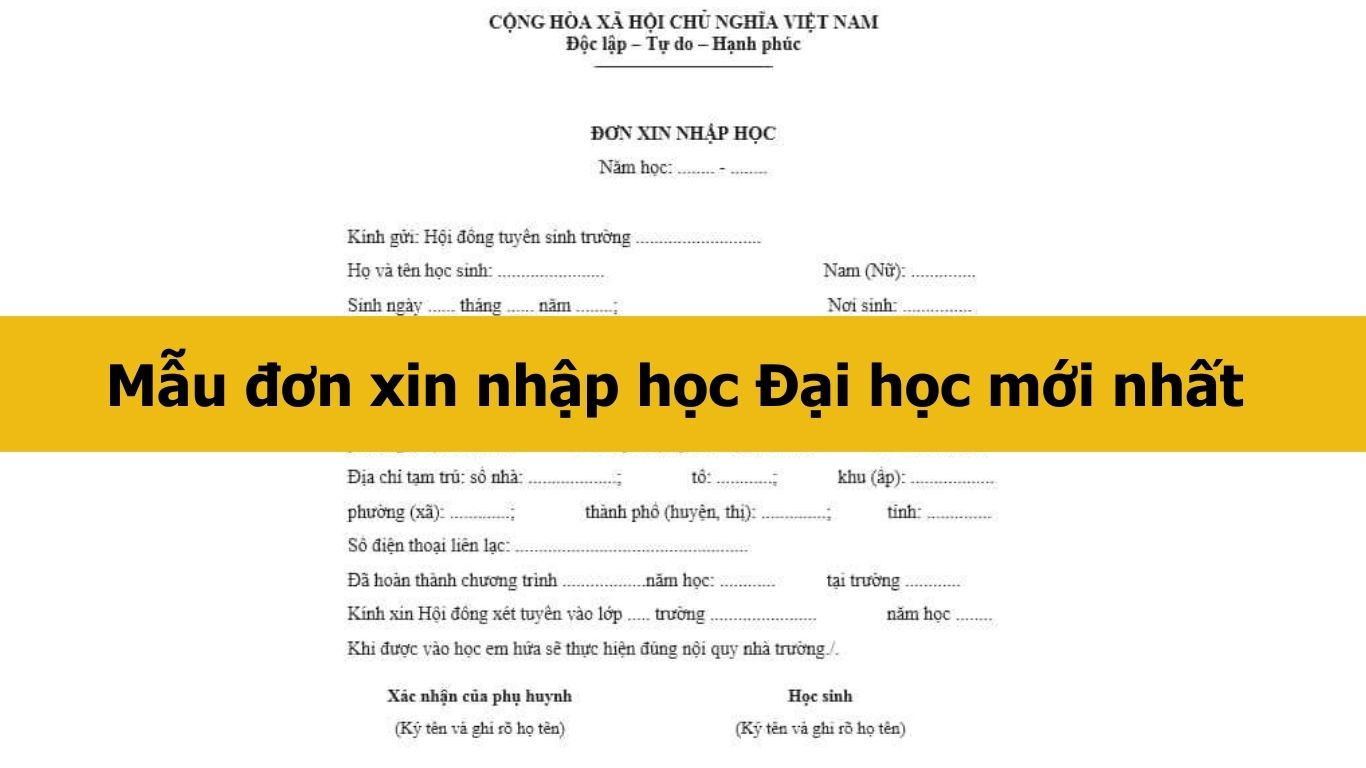
Mẫu đơn xin nhập học Đại học mới nhất 2025
Hiện nay, để chuyển đổi cấp học Đại học trong hệ thống giáo dục Việt Nam thì ngoài các tiêu chuẩn về trình độ, nhận thức còn có một thủ tục trước khi nhập vào cấp học này là phải có đơn xin nhập học. Nhiều phụ huynh còn phân vân chưa biết sử dụng mẫu đơn xin nhập học nào cho đúng. Qua bài viết này, chúng tôi sẽ giúp các bạn có được các mẫu đơn xin nhập học Đại học mới nhất và cách viết phù hợp. 20/01/2025Mẫu đơn xin nhập học THPT mới nhất 2025
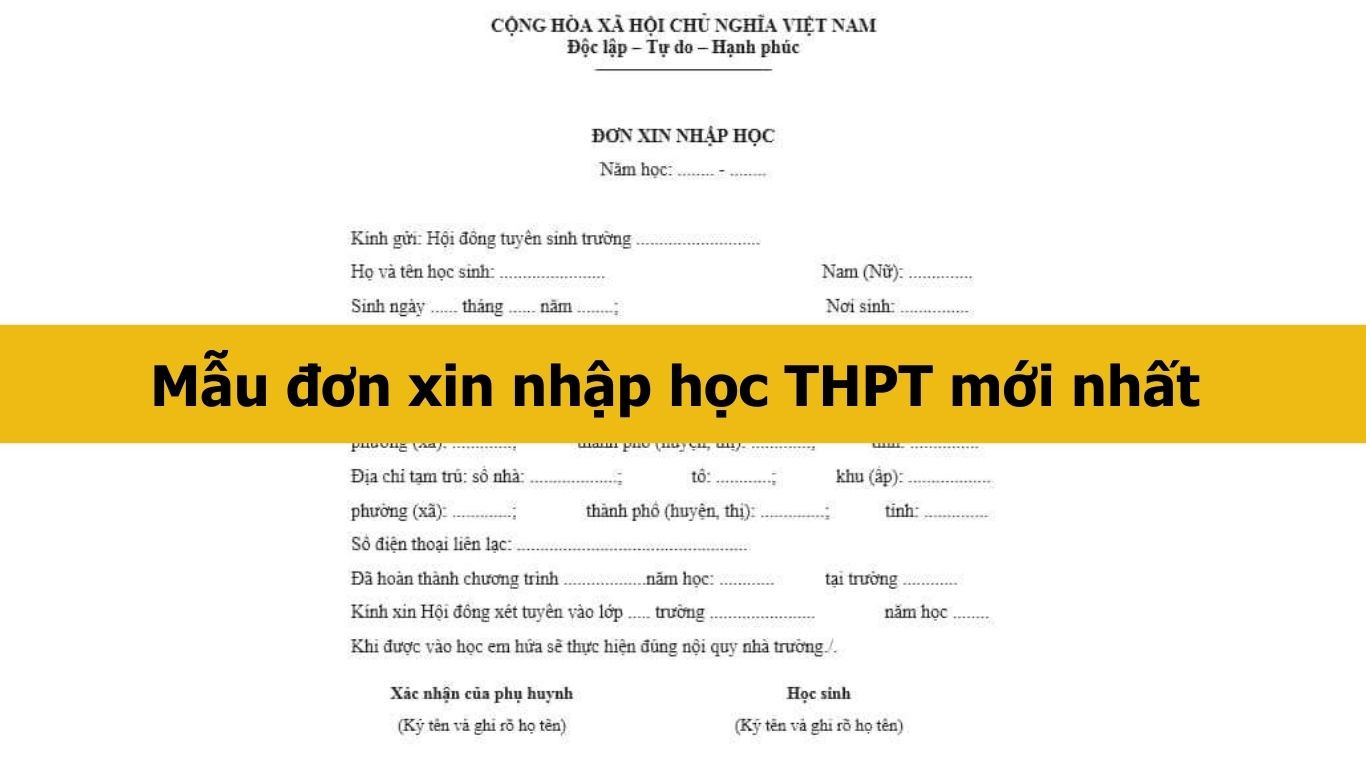
Mẫu đơn xin nhập học THPT mới nhất 2025
Hiện nay, để chuyển đổi cấp học THPT trong hệ thống giáo dục Việt Nam thì ngoài các tiêu chuẩn về trình độ, nhận thức còn có một thủ tục trước khi nhập vào cấp học này là phải có đơn xin nhập học. Nhiều phụ huynh còn phân vân chưa biết sử dụng mẫu đơn xin nhập học nào cho đúng. Qua bài viết này, chúng tôi sẽ giúp các bạn có được các mẫu đơn xin nhập học THPT mới nhất và cách viết phù hợp. 20/01/2025Mẫu đơn xin nhập học THCS mới nhất 2025
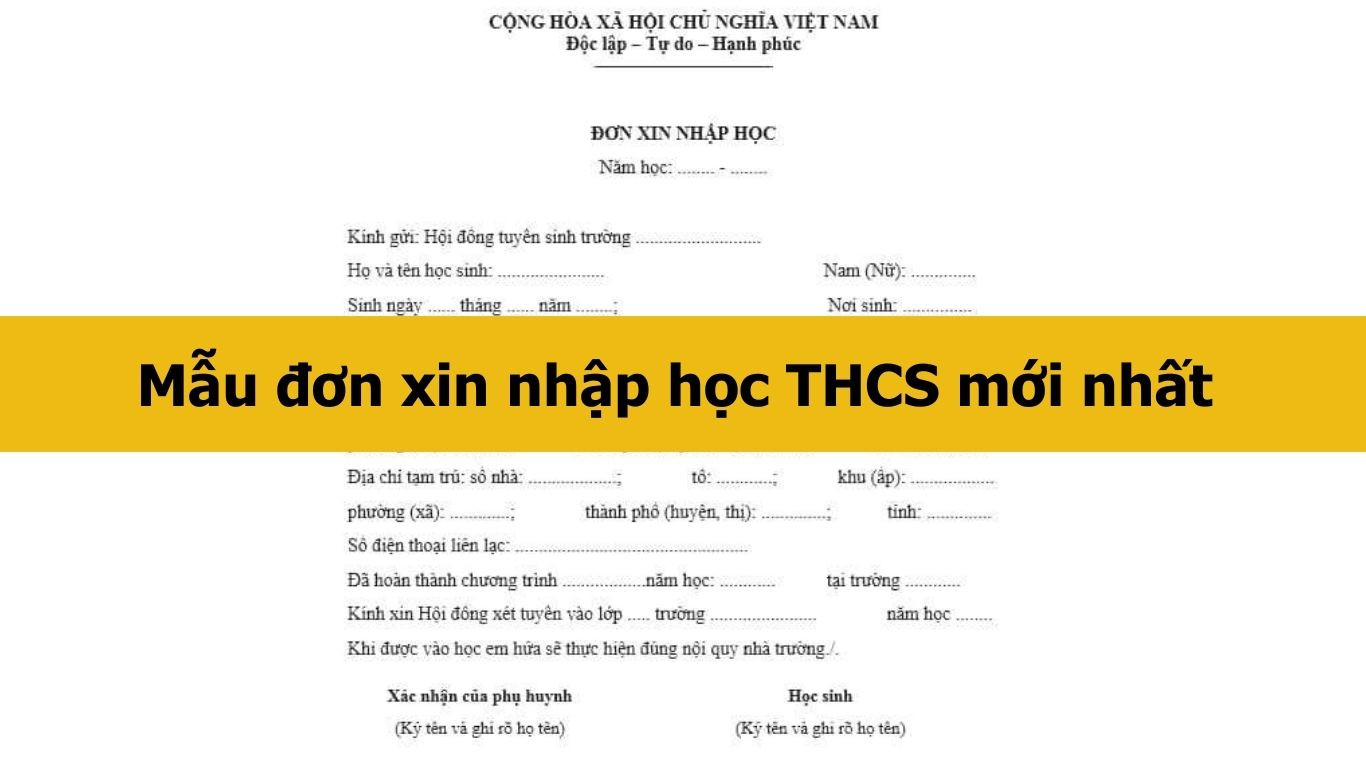
Mẫu đơn xin nhập học THCS mới nhất 2025
Hiện nay, để chuyển đổi cấp học THCS trong hệ thống giáo dục Việt Nam thì ngoài các tiêu chuẩn về trình độ, nhận thức còn có một thủ tục trước khi nhập vào cấp học này là phải có đơn xin nhập học. Nhiều phụ huynh còn phân vân chưa biết sử dụng mẫu đơn xin nhập học nào cho đúng. Qua bài viết này, chúng tôi sẽ giúp các bạn có được các mẫu đơn xin nhập học THCS mới nhất và cách viết phù hợp. 20/01/2025Mẫu đơn xin nhập học tiểu học mới nhất 2025
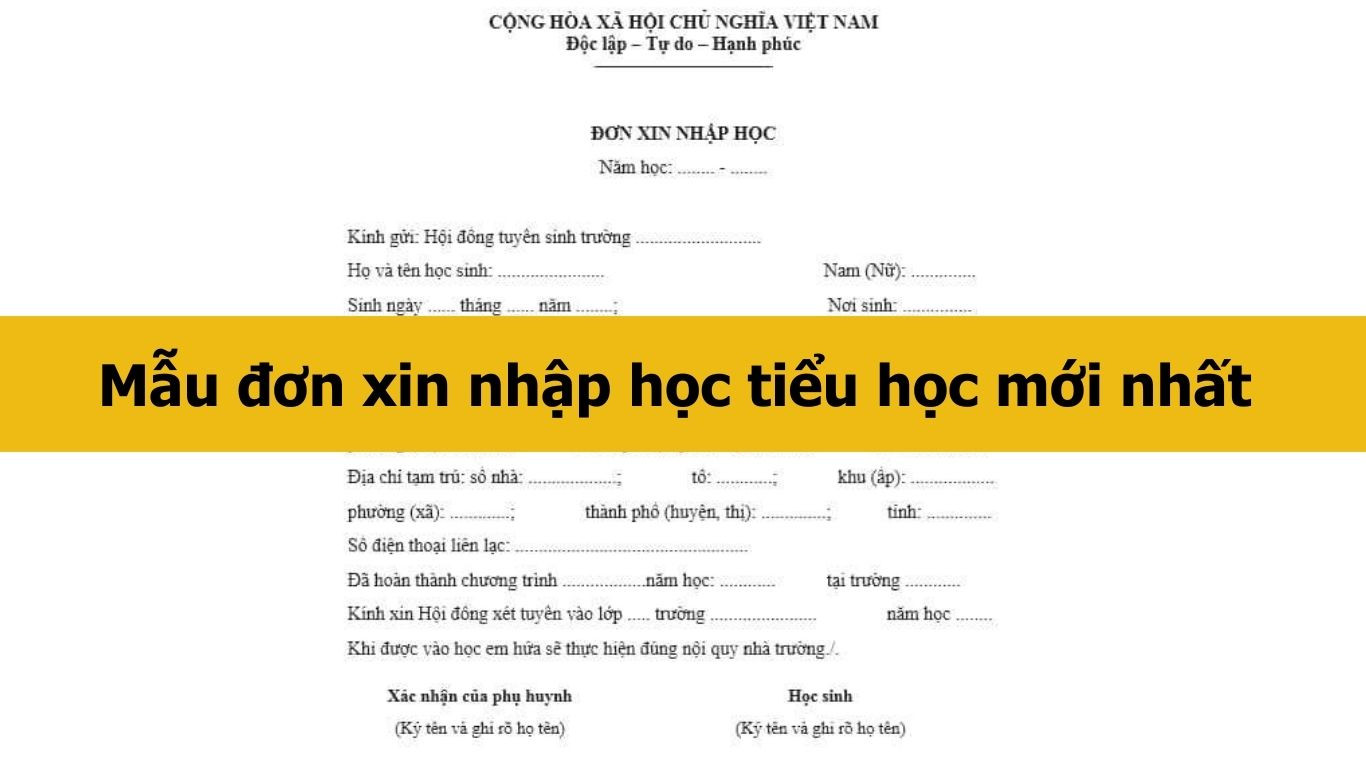
Mẫu đơn xin nhập học tiểu học mới nhất 2025
Hiện nay, để chuyển đổi cấp học tiểu học trong hệ thống giáo dục Việt Nam thì ngoài các tiêu chuẩn về trình độ, nhận thức còn có một thủ tục trước khi nhập vào cấp học này là phải có đơn xin nhập học. Nhiều phụ huynh còn phân vân chưa biết sử dụng mẫu đơn xin nhập học nào cho đúng. Qua bài viết này, chúng tôi sẽ giúp các bạn có được các mẫu đơn xin nhập học tiểu học mới nhất và cách viết phù hợp. 20/01/2025Mẫu đơn xin nhập học mầm non mới nhất 2025 và cách ghi chi tiết
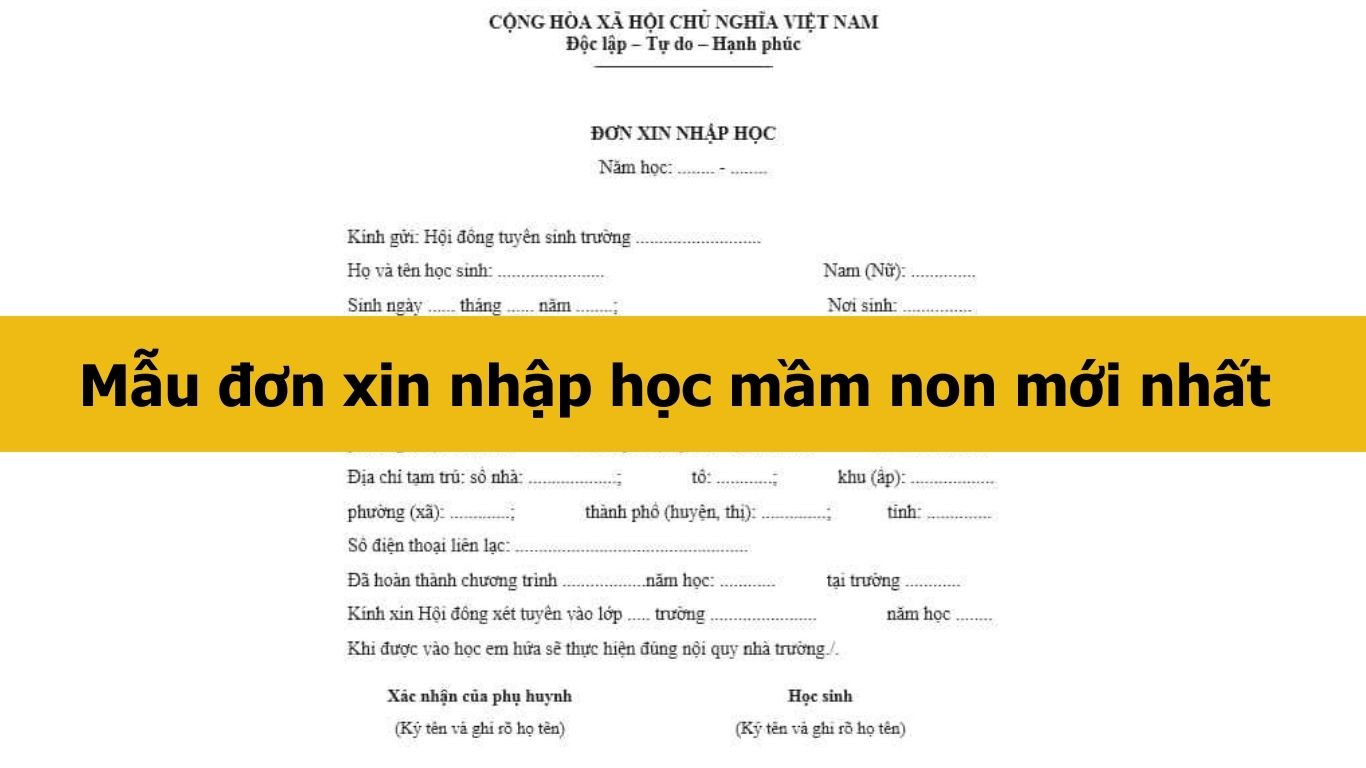
Mẫu đơn xin nhập học mầm non mới nhất 2025 và cách ghi chi tiết
Hiện nay, để chuyển đổi cấp học mầm non trong hệ thống giáo dục Việt Nam thì ngoài các tiêu chuẩn về trình độ, nhận thức còn có một thủ tục trước khi nhập vào cấp học này là phải có đơn xin nhập học. Nhiều phụ huynh còn phân vân chưa biết sử dụng mẫu đơn xin nhập học nào cho đúng. Qua bài viết này, chúng tôi sẽ giúp các bạn có được các mẫu đơn xin nhập học mầm non mới nhất và cách viết phù hợp. 20/01/202503 mẫu đơn xin nhập học mới nhất 2025 và hướng dẫn cách viết
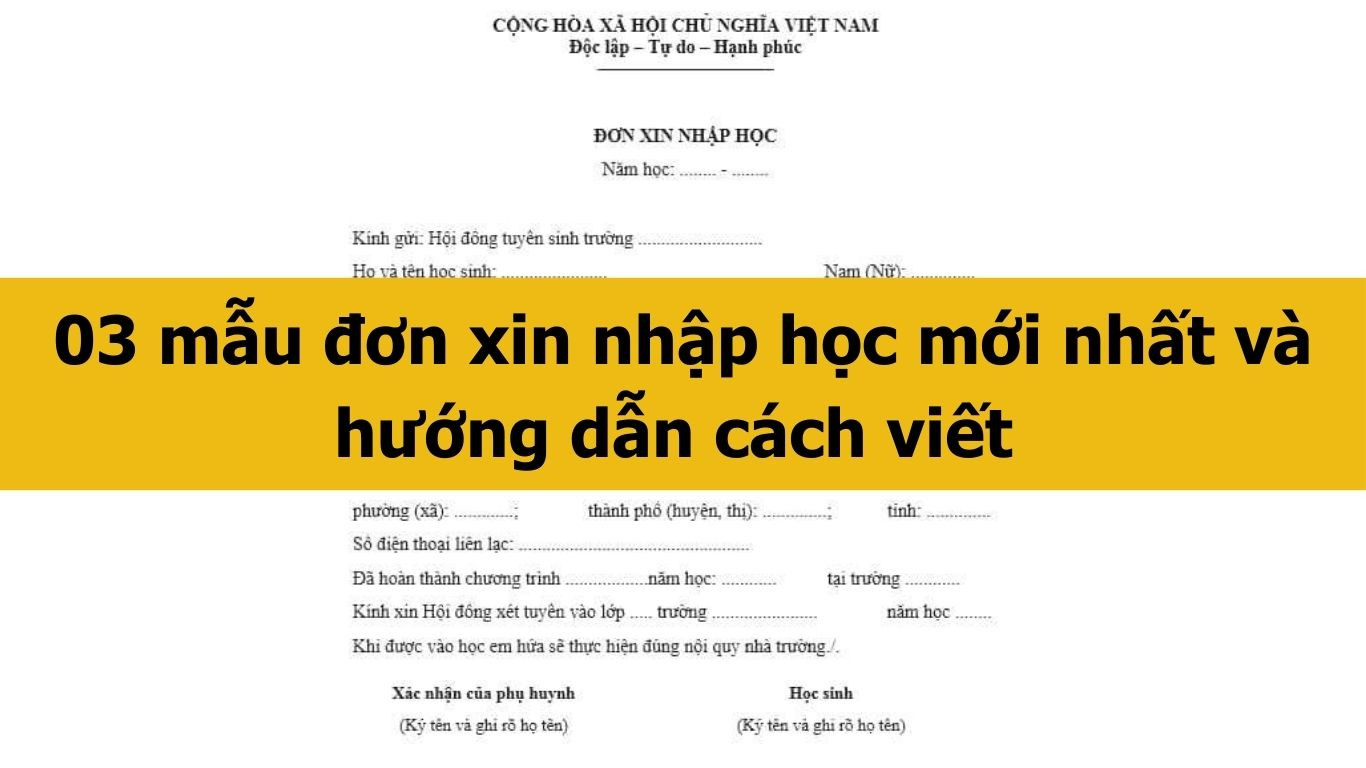
03 mẫu đơn xin nhập học mới nhất 2025 và hướng dẫn cách viết
Hiện nay, để chuyển đổi các cấp học trong hệ thống giáo dục Việt Nam thì ngoài các tiêu chuẩn về trình độ, nhận thức còn có một thủ tục trước khi nhập vào các cấp học là phải có đơn xin nhập học. Nhiều phụ huynh, học sinh còn phân vân chưa biết sử dụng mẫu đơn xin nhập học nào cho đúng. Qua bài viết này, chúng tôi sẽ giúp các bạn có được các mẫu đơn xin nhập học mới nhất và phù hợp. 20/01/2025Các hành vi bị nghiêm cấm với học sinh mới nhất 2025

Các hành vi bị nghiêm cấm với học sinh mới nhất 2025
Bản cam kết học sinh được sử dụng phổ biến trong nhà trường, văn bản này giúp học sinh đặt ra các mục tiêu phấn đấu trong học tập để có động lực cố gắng. Các hành vi bị nghiêm cấm với học sinh mới nhất 2025. Bài viết sau đây sẽ làm rõ về các vấn đề này 14/01/2025Cách viết bản cam kết không tái phạm cho học sinh mới nhất 2025

Cách viết bản cam kết không tái phạm cho học sinh mới nhất 2025
Bản cam kết học sinh được sử dụng phổ biến trong nhà trường, văn bản này giúp học sinh đặt ra các mục tiêu phấn đấu trong học tập để có động lực cố gắng. Vậy cách viết bản cam kết không tái phạm cho học sinh mới nhất 2025? Bài viết sau đây sẽ làm rõ về các vấn đề này. 14/01/202505 Mẫu bản cam kết của học sinh mới nhất 2025

05 Mẫu bản cam kết của học sinh mới nhất 2025
Bản cam kết học sinh được sử dụng phổ biến trong nhà trường, văn bản này giúp học sinh đặt ra các mục tiêu phấn đấu trong học tập để có động lực cố gắng. 05 mẫu bản cam kết của học sinh mới nhất 2025. Bài viết sau đây sẽ làm rõ về các vấn đề này 11/01/2025Năm 2025 học giáo dục thường xuyên có bằng cấp 3 không? Bằng tốt nghiệp giáo dục thường xuyên có giá trị như bằng tốt nghiệp trung học phổ thông không?
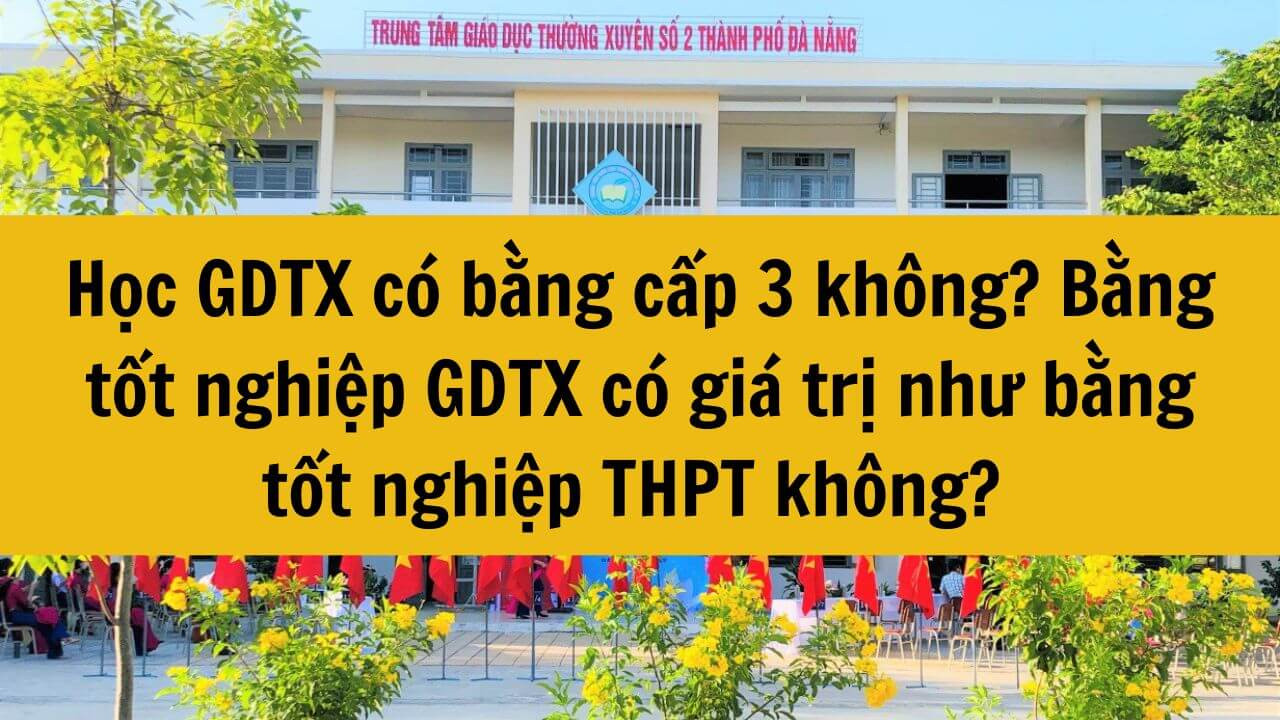

 Luật giáo dục 2019 (Bản Word)
Luật giáo dục 2019 (Bản Word)
 Luật giáo dục 2019 (Bản Pdf)
Luật giáo dục 2019 (Bản Pdf)